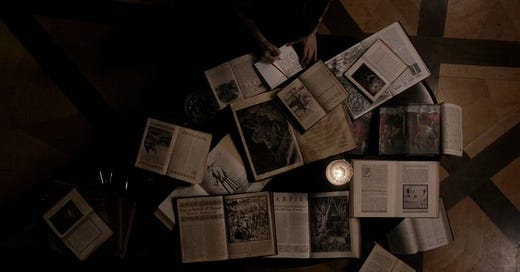I do not think it an accident that modern fantasy was invented by a Catholic. One feature of the attitude inculcated by sola Scriptura is an aversion to fiction, particularly that which departs from straightforward applications of Biblical themes, and especially that which departs from ordinary life. Witness the popularity of Jane Austen in comparison to the languishing of the myths about King Arthur in Protestant England. There is nothing wrong with Jane Austen—she is a towering literary figure, to whom we owe thanks for helping invent the novel. But it illustrates a trend.
Catholic Italy gives us Dante, with his titanic journey through the depths of human evil to the heights of divine splendor. Biblical Christianity is the oxygen in Dante’s blood. A first, uncritical glance will not reveal this, however. You have to understand the Bible and the Divine Comedy before you can see one in the other. Compare with English’s greatest allegory, John Bunyan’s Pilgrim’s Progress. You have to know nothing about the Bible or Pilgrim’s Progress not to see one in the other. Or again take Milton’s Paradise Lost and Paradise Regained. Although he seems to mention every myth the Greeks ever considered recording, his story is ultimately a Bible story.
I don’t think it’s bad that there are Bunyans as well as Dantes. But perhaps I can put it this way. Catholicism sees how to build and consecrate schools, banks, homes, tennis courts, and grocery stores. Protestantism only knows how to build churches. Protestants tend to think that in order for something to be holy, to express Christian truth, it needs to clearly present major Biblical themes. But Catholics are much more willing to explore uncharted regions. For them, the great fun is to imagine how the deep Christian truths would work under every circumstance. This includes deeply distressing circumstances, such as those imagined in Shusaku Endo’s Silence and films like “The Mission” or “Calvary.” A gem reveals all its sparkling facets and hidden faces when turned over in the light. What is Christianity but a gem of surpassing value?
Protestants may have counterexamples ready to go. What about Lewis and MacDonald and Spenser and Shakespeare and Connie Willis and J.K. Rowling and and and…? Yes. There have been great Protestant fiction writers who engaged the fantastic, though almost all of them before Tolkien were Anglican, i.e., the most Catholic of Protestants. After Tolkien gifted us with the notion of “sub-creation” and invented the modern fantasy genre, an explosion of books taking up the theme followed, and many Protestants have directly or indirectly imbibed his influence. The whole concept of “world-building” is (as near I can tell) a direct result of The Silmarillion. So the most imaginative Protestants have typically been the most nearly Catholic, or are directly influenced by a Catholic.
Let me change tack. When I started reading G.K. Chesterton, I got the persistent feeling that his skies were higher and colors deeper than mine. Add the more troubling sensation that there might be colors in his world I could not even see. I read Walker Percy and had the same thought. It met me again in Walter Miller’s A Canticle for Leibowitz. Worst of all, I began to discern it in the Thomists, that is, the philosophers and theologians working in the legacy of Thomas Aquinas. When they spoke about a love for the sheer reality of the world, the joy of being, the “friendly universe” of Lonergan, I heard distilled what I’d listened to in a thousand variations from Dante, Augustine, Athanasius, Thomas, Irenaeus, Newman, and my Catholic friends. The Catholic writers have an insatiable hankering for reality and an incorrigible conviction that they will find good things. And this is just what we should expect from fully converted Christians.




